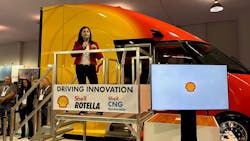Technologist devotes 20 years to innovation at Shell
Growing up in Istanbul, Turkey, Selda Gunsel loved solving problems. Math and science were her favorite subjects in school, so she knew that when she went to college, she would pursue a degree that leveraged both subjects to solve real-world problems.
Gunsel, whose parents were both educators and encouraged her to go as far as she could in her education, studied chemical engineering at the Istanbul Technical University in Turkey before moving to the U.S. and earning a Ph.D. in chemical engineering from Penn State University. Her doctoral research was focused on a multidisciplinary field called tribology, which comes from the Greek word that means rubbing.
“So, it’s really the science of friction, wear, and lubrication,” Gunsel told FleetOwner.
See also: Women in Transportation 2023
That research focus was fitting since today Gunsel is the president of Shell Global Solutions, which is the technology arm of Shell. She is also the VP of global lubricants and fuels technology within Shell’s Projects and Technology organization. In her role at Shell, Gunsel leads a global group of scientists and engineers who deliver innovation, R&D, and technical services to Shell Lubricants, mobility, and B2B operations. Before joining Shell in 2002, Gunsel was the VP of technology development and innovations at Pennzoil.
Very early on in her career—before Pennzoil and Shell—Gunsel hit a roadblock when she was encouraged to apply for a job by one of the hiring managers at her workplace, but she wasn’t successful. When she asked for feedback, she was told the candidate chosen was someone that the hiring manager felt more comfortable with because they shared the same cultural background, attended the same schools, and played the same sports.
“This was very painful to hear, but on the other hand, it was a great learning experience for me,” Gunsel said. “When we pick candidates for our teams, we tend to pick people we can relate to, who have similar backgrounds and experiences. This is human nature. I always try to break this cycle. We need to take risks, and I strongly believe in diversity and the link between diversity and innovation. If you have people with diverse experiences and diverse ways of thinking, the outcome is much more innovative.”
“I found it really difficult to be the mother I wanted to be and continue to perform at work to my own standards,” she said. “I try to strive for excellence in everything I do, and it was impossible to do that as a working mom. I owe a lot to my parents and my husband. It’s because of their support I was able to manage it, and today I am a very proud mother of two daughters—one is an engineer and the other one a doctor. So, I am very happy that they share the same passion about science and technology that I do.”
Over the years, and regardless of the job titles she’s held, Gunsel said she is a technologist at heart.
“I have devoted most of my career to technology innovation, and I am really passionate about how science and technology change the world and improve quality of life,” Gunsel said. “Technology and innovation are in the DNA of Shell. As an engineer, I really enjoy working for a company where I never have to talk about the importance of technology innovation or technology leadership; it’s just a given at Shell.”
A lot of Gunsel’s work at Shell has been on the Starship initiative, which was launched in 2018 to demonstrate how far the trucking industry could push the boundaries of energy efficiency in commercial road transport. Every variation of the truck—now onto Starship 3.0—integrates readily available energy efficiency technologies like aerodynamics and low-rolling resistance tires with the latest energy efficiency innovations.
Putting the truck to test on coast-to-coast demonstrations, Shell has seen significant fuel economy and freight ton efficiency improvements over the years. The latest-generation Starship 3.0 truck will run on Shell renewable natural gas rather than diesel and has been integrated with the new Cummins X15 natural gas engine.
Gunsel noted that Shell is also working on all other areas of decarbonization solutions, such as biofuels, renewables, hydrogen, and electric mobility.
“There will always be some remaining emissions that we will need to address,” Gunsel said. “So, we are working on some technologies such as carbon capture and storage to address the remaining emissions in society.”
When asked about her career and any advice she has for others, Gunsel advised getting involved in professional organizations relevant to the job early on. She also emphasized the importance of mentors.
“They can play a role in guiding early career professionals,” Gunsel said. “I benefited from having mentors throughout my career. They can help you understand your purpose and are motivators. It’s also important to be self-aware of our strengths. I believe we make the biggest impact in our roles if we focus on our strengths and building up on them.”
About the Author

Cristina Commendatore
Cristina Commendatore is a past FleetOwner editor-in-chief. She wrote for the publication from 2015 to 2023.

